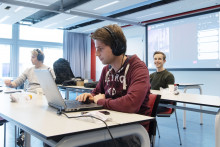What does this crisis do to students, mentally speaking?
Van Dijken: 'It seems as if the problems that otherwise affect students - either social, emotional or psychological - are being pushed into the background. Other, more acute concerns now have priority.'
What kind of worries are there now?
'For example, about practical matters such as personal finances and rent, or about following courses or taking exams remotely and what consequences this situation has for their studies. But also general fear of the virus or worries about family and friends back home.'
'All of a sudden, we're living in a very different reality. But I can't say that there are more or less worries, there are other worries. Some people experience the situation as relaxed, others have lost their daily structure. Generally speaking, everything you worry about is more or less at the expense of your studies.'
Are there differences between Dutch and international students?
'For Dutch students, this situation can generally be better handled. They can return home more easily and rely on the support of people close to them. In addition, they can borrow more extensively via DUO, in case of any financial need. That, in turn, does not apply to international students.'
What about loneliness?
‘It’s funny to see: a lot of social activities are organized digitally. And we don't see any increase in loneliness complaints. Of course, there will undoubtedly be someone who feels lonelier because of this situation, who needs face-to-face contact. But we haven't picked up any signals about it.'
How do you support your students at the moment?
'Basically the same as usual. If you want to make an appointment, you can. Students can now indicate whether they want to do so by phone or via Skype, then one of the deans or psychologists will contact you. Our career counsellors also work online. And the group sessions also continue, via Skype.'
To conclude, what do you students give as tools for mental health during the crisis?
'We have a special webpage for this purpose, including an instruction video for dealing with stress and anxiety as a result of the corona crisis. Furthermore, we especially recommend that you find a rhythm and organize your days as structured as possible. Think of studying or eating at fixed times, getting enough physical exercise ánd rest and digitally maintaining social contacts. It's good to discuss any problems you may have with others.’







